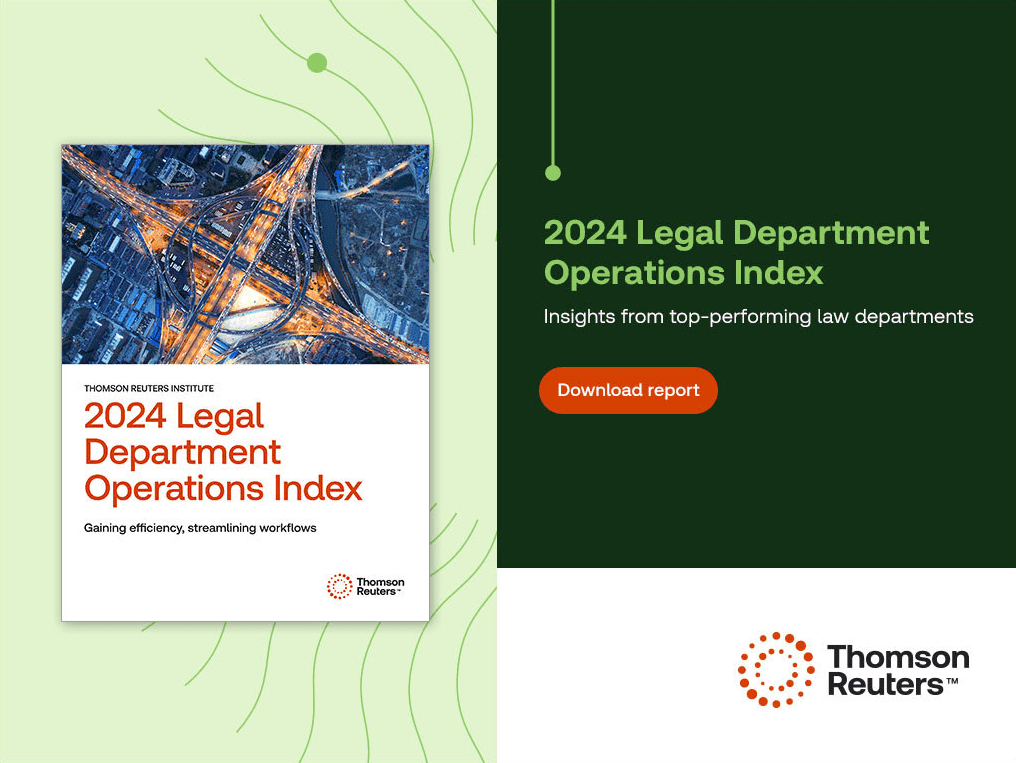Legal teams across industries and organizations face common challenges, despite their diverse circumstances. Many are placing a high priority on controlling expenses while their matter volumes increase. Most are working with flat or declining budgets and attorney headcounts. And still, more than a third are bringing more work in-house.

That’s according to the most recent Legal Department Operations Index Report from Thomson Reuters. The report underscores the urgent need for legal teams to meet business needs as efficiently as possible, selecting the right fit in terms of outside counsel versus handling in-house, and understanding market rates to be sure they aren’t overpaying.
Legal teams focus on outside counsel spend to manage shrinking budgets, rising workloads
Legal departments are doubling down on cost efficiency and transparency, with 76% of teams ranking outside counsel cost control as a top priority—up 6% from last year. Real-time spend tracking and analytics tools are becoming essential as more than half of departments face flat or shrinking budgets, even as 79% report increased case volumes and 67% operate with stable or reduced headcount.

While traditional cost-control methods like billing guidelines and standard discounts remain popular, less conventional strategies are gaining ground. Only 20% use corporate procurement policies, yet 37% of those who do rank it among their top three effective tactics. Competitive bidding for outside counsel—used by a minority but highly rated by those who do—also ranks among the most impactful approaches.

Workflow efficiency is equally front and center, with 58% of departments citing automation as critical to handling “more with less.” AI is poised to be a game-changer, with legal professionals estimating it could save four hours per week on average. However, 57% of legal tech budgets remain flat, leading teams to repurpose funds rather than boost investment.
While cost metrics dominate tracking priorities, just 25% of departments monitor qualitative metrics like outcome quality, law firm diversity, or savings from tech. This gap in data may leave some departments lacking a complete picture of their operational value to the broader business, underscoring the need for balanced tracking.
Upgrading your approach to spend management
Legal teams understand that improving metrics requires clean, efficient access to data. And they need to rely on technology to automate mundane and manual tasks to allow the team to focus on legal and project management work.
Many organizations use Legal Tracker Advanced from Thomson Reuters to streamline their spend management strategy and processes, making sure they have the data, insights, and workflow tools they need to manage spend effectively and efficiently.
Some of the key spend management capabilities of Legal Tracker Advanced include:
Rate management insight: Analyze your outside counsel’s rates and rate increases versus similar firms handling similar matters. The comprehensive data includes $230 billion in legal spend data. It helps you see where you are paying more or less than market rates for specific work, based on location and other factors. This data gives you the power to decide if you want to keep matters with the firm you’re currently using or shop for a comparable firm that provides better rates. You may decide to reserve the highest-priced firms for specialty or high-stakes matters and use mid-sized firms with lower rates for routine work.
Matter pricing and RFP: Easily submit requests and compare firms’ bids for matter-level fees. You’ll save money, as more proactive, informed negotiations help you secure the best price. With matter-level pricing you’ll have predictability along with more efficient delivery from the law firm. Knowing benchmarks for the pricing of these matters helps you create a more targeted, competitive, and objective firm selection process.
Simplified billing process: The ebilling capabilities of Legal Tracker significantly streamline your accounts payable activities. The searchable e-invoicing system eliminates paper approvals. Your team can automate currency conversion and enforce timekeeper rates, expense compliance, AFAs, and other billing guidelines. You can set legal budget and spending alerts by time, matter, or phase, while separating tracking of domestic and foreign taxes aids financial recordkeeping. Done manually, these tasks are a drain on resources and may often get put on the back burner as your operations team focuses on supporting matter management. And without visibility into discrepancies, you won’t know if you’re overspending.
Don’t leave money on the table
We have found that legal departments that implement Legal Tracker Advanced from Thomson Reuters benefit from up to 15% savings in annual legal spending. Are you positioned to realize those savings too?
With Legal Tracker, your organization can achieve greater financial control, reduce unnecessary expenditures, and improve overall budget management. Its user-friendly interface and robust reporting features make it an ideal choice for legal departments aiming to enhance their financial oversight.

Take your corporate legal department to the next level
See first-hand how Legal Tracker can help you reduce your department's legal spend and enhance collaboration with outside counsel
Product overview ↗Discover how Legal Tracker can revolutionize your spend management strategy. Learn more about the system’s capabilities and request a personalized demo for further insights.












